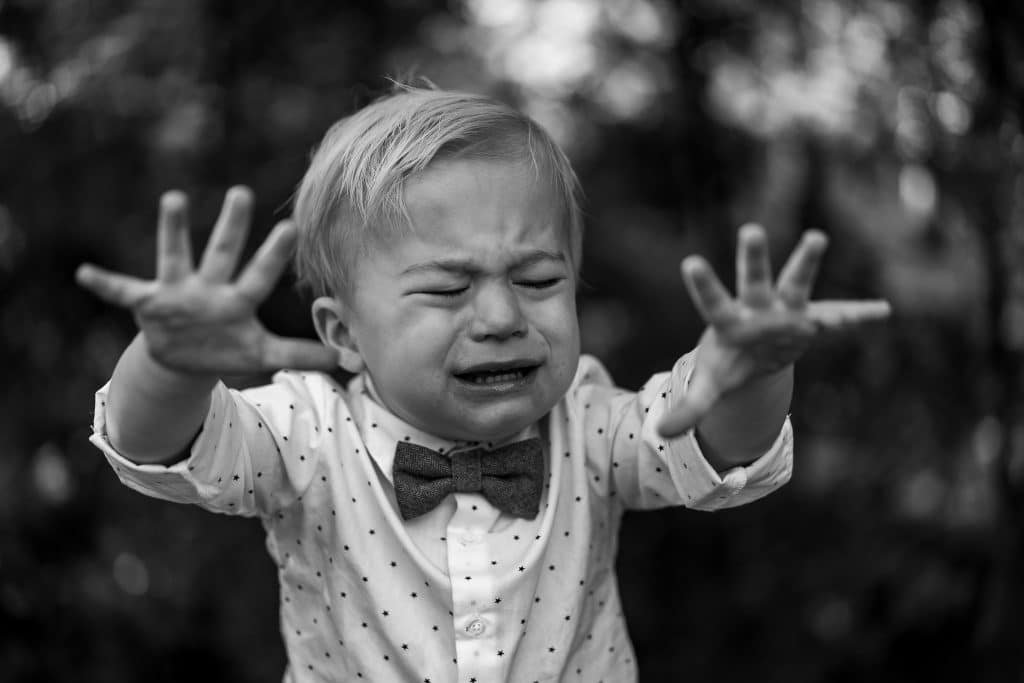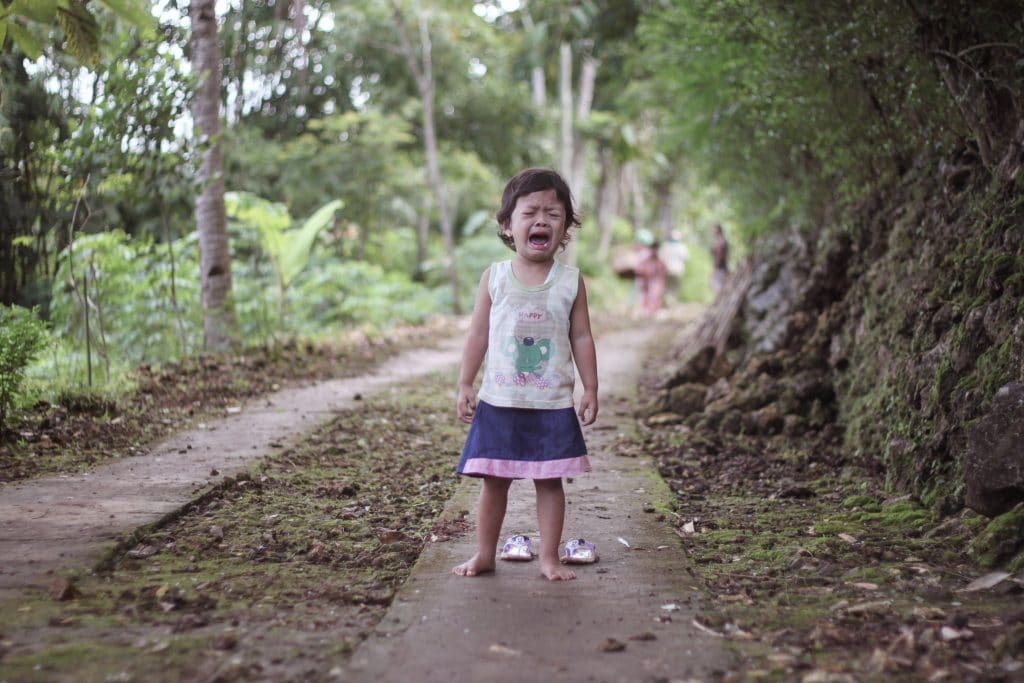I’ve got to be honest. I started and stopped writing this four times now. Legitimately wrote a paragraph, then deleted it. Nothing felt right, and I think I know why: because there is no pride in making a child cry.
I’ve been on the wrong end of that more times than I would like to admit. I guarantee I can make any child cry in under 10 seconds, and that doesn’t make me proud. However, it is what it is, and sometimes you stand your ground and your kid cries. Sometimes you pick the orange cup and not the green one, and your kid cries. There’s no going around it.
And for you, I hope that it is all very simple. I hope it’s the color of the cup or the fact that your child’s sock got scrunched down and is too bothersome while they walk. Unfortunately, there are so many other dilemmas in a child’s life that will make them cry, and you may very well be one of those dilemmas. A perfect example of this can oftentimes be found in the angst of a moody teenager. Man, I love my kids so much, but teenage years are by far my least favorite.
As I write this, I am balls deep in the hormonal imbalances of a teenage girl. Some days, I am the moon and the stars. Other days, I am the gum stuck to her shoe. And as I began this, I thought I would have tons of witty repartee to regale you that would be both humorous and educational. School you on the countless reasons your daughter hates you. And that’s funny enough, but the real grit we are going for here leads me down a harder path. Sure, teenagers are a great topic to discuss when speaking on crying. I mean, who knows how to cry better than a hormonal girl? It’s just…the truth is that puberty is unavoidable.
But when I think about making a child cry, or the cries of my child, I am directly brought to a dark and torturous scenario that many never experience, and those who do, hide even the faintest inkling that it’s bothersome and life-interrupting, even though it is. Those tears are not those of a teenager, but of a child…toddler in my case, who is what they call “nonverbal.” A child who cries because it’s their only form of communication. If I’m being honest, one of the hardest things I’ve ever dealt with are the tears of a child who cannot express themselves to you.

A speech or developmental delay in a child can be a big struggle for a family. My family began with three girls, and obviously tears flow quite freely in my house and always have. I’m very sensitive myself, so I get how this happens. When my husband and I decided to try again for a boy, we were blessed with twins! One boy and one girl. Two great joys all balled up in one uterus! I was over the moon. I also thought I knew something about parenting. But then I had a boy.
Everyone says that boys mature slower than girls. I had little to no experience with a baby boy. I took the advice of the veterans before me. I never got peed on during a diaper change, I constantly told my son to stop touching his privates while eating, and I got used to the dirty little hands that always found my white clothing.
But at the twins’ second year checkup, I was hit with a big blow. Everyone around me said my son cried a lot. Too much. Said that he would get frustrated too easily, and noticed that he never really spoke. I always reverted back to “boys mature slower than girls” and stuck by that up until that appointment. When I casually mentioned it to Dr. Sloan that day, I was sure she would just scoff and tell me not to worry. That’s not what happened. She told me that by his age, he should have 200+ words. That seemed like a very unreasonable amount of words for a small child, but as I thought about it…his twin spoke way more than 200. In fact, comparatively speaking, she was well beyond 200 while he had maybe 5-10.
When Dr. Sloan suggested speech therapy, I was not sure what that meant besides I had failed as a mother. Stupid, I know. Regardless, I cried the whole ride home. (Thank God for dark sunglasses.) I thought I had done something wrong. How could he be different. Delayed?! What does that even mean? Who do we blame for this? Why is he like this? All that good old fashioned guilt just ran up on me and smacked me square in the face.
Truthfully, in the quiet reflection of my mind, I knew there would be no defendant being prosecuted for delaying the speech of my son, but I couldn’t help but feel persecuted.
It began so organically. I just figured he was a “mama’s boy” and took a teeny bit of delight in knowing that when I left, he would cry, or if it wasn’t me giving him the dinner, he didn’t want it. But now, armed with the knowledge of a quick Google search, I learned that all the crying could be his outward way of showing how he felt because he didn’t know the words to say it. I’ll explain, because if you’ve never dealt with a child with special needs, then you may not know. It looked a lot like this:
He was hungry and would give the cues to hunger. He would run and stand at the foot of the snack cabinet and then begin the task of figuring out what he wanted. I would pull Cheezits and he would scream. Okay, no, what’s next? Cheerios. He would get more erratic, so clearly, he wasn’t in a cereal mood. Next an Oreo. I mean, seriously, who could say no to the goodness of an Oreo? Now he was becoming violent, hitting the food away from him. And after 10 minutes of being abused by a tiny human of my own creation, now I was getting pissed. Now we are both standing around, yelling nonsense about snacks.
And as I reach for my water bottle to gather myself with a sip, it turns out he wanted water all along, and he brazenly takes my cup and walks away.
Now, if this was a once-in-a-while behavior, it may not have been an issue. But this happened all the time for every possible circumstance. He didn’t want to share a toy, so he hit you with it. He didn’t want to wear pants, so he threw them at you. He didn’t want to sit at the table, so he would bang his hands down on the table and cry until you allowed him up. All the while, I was chalking it up to his age and gender, but it turns out I was sorely mistaken. I found myself more and more stressed and stretched. You know something is wrong when you’d rather deal with a moody teenager than a two-year-old boy.
The months that followed were full of evaluations and psychologist appointments and speech therapy sessions. My son was unable to express himself verbally, so we needed to deal with it now before it turned into a full blown issue, although some might speculate we were already full blown. By the time I met with the psychologist, I was at what some call their wits’ end, but truthfully, I was losing my mind. I sobbed openly in a room filled with strangers who were evaluating my son on things he should know but didn’t.
He was no prince during these times, either. When being “tested,” they assured me he would never even know he was being tested, but he did. He wouldn’t make eye contact, and he hit the social worker. I was mortified. I left that meeting thinking surely DCFS would be knocking on my door that night.
But to my surprise, after that meeting, things all began to fall perfectly into place. He was approved to receive one hour of speech therapy a week up until his third birthday, when he would transition into a school environment where he would go a full five days a week for 2.5 hours a day. I began to watch him grow and flourish into a speaking child. Where he would once make you physically bring him to the snack so that he could grab what he wanted, he could now name the item he wanted—and politely, might I add. And it didn’t exactly sound like Goldfish, but it was damn close.
It’s still a work in progress. He’s still a work in progress.
A side note is that I had no idea about speech delays or developmental issues. To my naive mind, you either were on the spectrum or you weren’t. If you couldn’t see the delay externally, then there wasn’t one. But coming into this world of therapy and speech and social workers and interventional education plans has shown me a whole new world of children I never knew existed. And a whole new world of parenthood I may have misjudged previously. Maybe that kid in Target wasn’t a spoiled brat and he actually had some form of delay like my Elliot. Maybe we don’t all fit in this box that society says is normal. Maybe more people than you’d think started out this way, too. Maybe crying children aren’t just entitled kids who want the color cup they’re thinking about instead of the one you give them. Maybe each tear has a voice and says a different thing, but we as adults are just too far along to see that some kids need more. Some kids need extra.

Sometimes big girls DO cry. And that’s okay. Once I opened my eyes to the possibility that I wasn’t alone in this aisle of parenting, there was a whole new circle of friendships and bonds that opened around me. I became weepy the day of his last speech therapy with Miss Jamie as we decorated pumpkins and I sat in awe of a boy who once couldn’t say “hi” now saying, “Bye, Miss Janie,” and even though he mispronounced it…we took it anyway.
I think in the end, when you upset your child, there’s never a proud moment that rolls out of that. You don’t don yourself with a badge in the shape of a teardrop. Remember when your parents said it hurt them more than it hurt you? They were right all this time, although we don’t have to tell them if we don’t see fit. Ever grounded a teenage girl? It’s torture! Not just for her, but for anyone who is in the wake of her hormonal wrath. The trend here is, it sucks. When your kid is upset and you’re the cause, it sucks.
But here’s a nugget of knowledge my husband can be heard oftentimes saying: “If you do it for the right reasons, you can’t go wrong.” Kids are resilient, and they’ll bounce back as long as you’re disciplining them for a reason that is beneficial for them on a human level. Making them feel badly about themselves or bullying them is not parenting; it’s mean, and sometimes it’s the anger we give that we get back from them. Try getting on their level. Physically squat down and make eye contact. Use words that aren’t hard, and at all costs, try to be as kind as you can. They’re trying their very best, which will never be sufficient until you allow them to be themselves .
Not to say we shudder at an alligator tear. Know the difference between real emotion and manipulation. Kids can sense that their crying gets to us at our very core and can be used against us. At the end of the day, we have to have the best judgement of when a behavior is too much and maybe needs addressing.
Whether it’s speech or developmental therapy like my son had, or it’s mental health help for a moody teenager, both options are both attainable and can help when you as a parent feel lost. Trust professional people like pediatricians and teachers, nurses, and other parents who you may think are doing it terribly. There are lessons on each occasion if only we see. Sometimes, we just have to squat down a little to get a better angle.
Reality Changing Observations:
1. Have you ever seen or heard a child having a tantrum and judged their parent for it? Did it occur to you that the child might have something else going on behind the behavior?
2. Does anyone in your family or social circle have a child with different developmental levels and needs? Have you ever lent your support? Could you?
3. Do you know any pediatricians, teachers, or therapists whom you’d like to ask questions about this subject?







I can’t help but feel convicted. I absolutely think “I am sure they can at least try to get their child under control.” I have been around people who have children with disabilities and I find that I am personally very patient and kind to those children; however, I do see that sometimes the parent is tired and trying their best to continue learning about the needs of their child. It does take a village because that small time of someone showing kindness to a child may go such a long way to a parent who lives it every day… Read more »